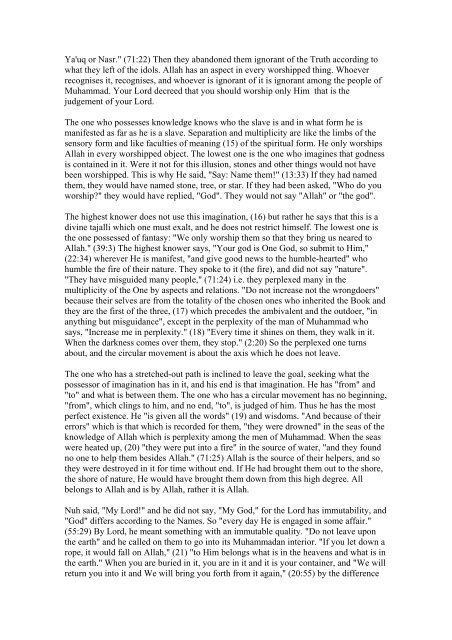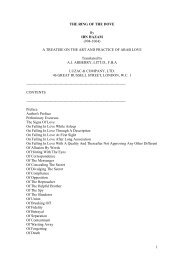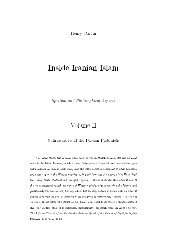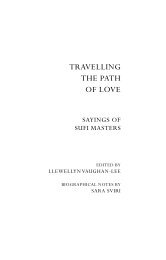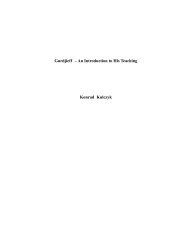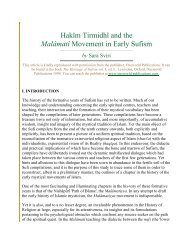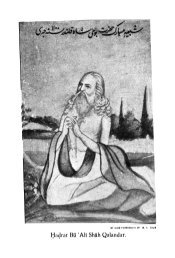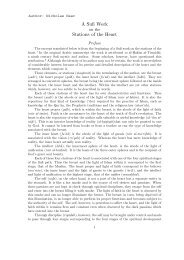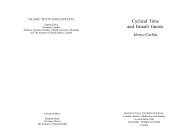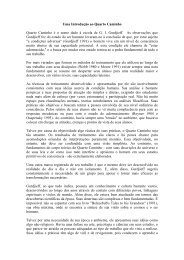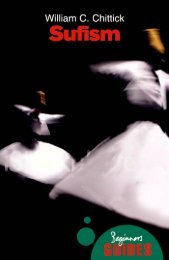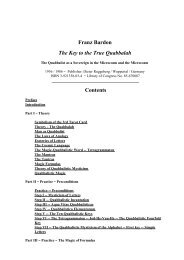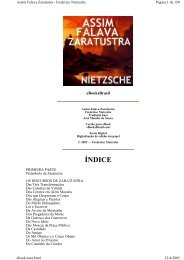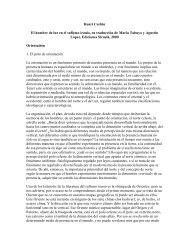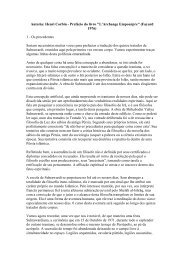Fusus al-Hikam The Seals of Wisdom by Shaykh al ... - ImagoMundi
Fusus al-Hikam The Seals of Wisdom by Shaykh al ... - ImagoMundi
Fusus al-Hikam The Seals of Wisdom by Shaykh al ... - ImagoMundi
You also want an ePaper? Increase the reach of your titles
YUMPU automatically turns print PDFs into web optimized ePapers that Google loves.
Ya'uq or Nasr." (71:22) <strong>The</strong>n they abandoned them ignorant <strong>of</strong> the Truth according to<br />
what they left <strong>of</strong> the idols. Allah has an aspect in every worshipped thing. Whoever<br />
recognises it, recognises, and whoever is ignorant <strong>of</strong> it is ignorant among the people <strong>of</strong><br />
Muhammad. Your Lord decreed that you should worship only Him that is the<br />
judgement <strong>of</strong> your Lord.<br />
<strong>The</strong> one who possesses knowledge knows who the slave is and in what form he is<br />
manifested as far as he is a slave. Separation and multiplicity are like the limbs <strong>of</strong> the<br />
sensory form and like faculties <strong>of</strong> meaning (15) <strong>of</strong> the spiritu<strong>al</strong> form. He only worships<br />
Allah in every worshipped object. <strong>The</strong> lowest one is the one who imagines that godness<br />
is contained in it. Were it not for this illusion, stones and other things would not have<br />
been worshipped. This is why He said, "Say: Name them!" (13:33) If they had named<br />
them, they would have named stone, tree, or star. If they had been asked, "Who do you<br />
worship?" they would have replied, "God". <strong>The</strong>y would not say "Allah" or "the god".<br />
<strong>The</strong> highest knower does not use this imagination, (16) but rather he says that this is a<br />
divine taj<strong>al</strong>li which one must ex<strong>al</strong>t, and he does not restrict himself. <strong>The</strong> lowest one is<br />
the one possessed <strong>of</strong> fantasy: "We only worship them so that they bring us neared to<br />
Allah." (39:3) <strong>The</strong> highest knower says, "Your god is One God, so submit to Him,"<br />
(22:34) wherever He is manifest, "and give good news to the humble-hearted" who<br />
humble the fire <strong>of</strong> their nature. <strong>The</strong>y spoke to it (the fire), and did not say "nature".<br />
"<strong>The</strong>y have misguided many people," (71:24) i.e. they perplexed many in the<br />
multiplicity <strong>of</strong> the One <strong>by</strong> aspects and relations. "Do not increase not the wrongdoers"<br />
because their selves are from the tot<strong>al</strong>ity <strong>of</strong> the chosen ones who inherited the Book and<br />
they are the first <strong>of</strong> the three, (17) which precedes the ambiv<strong>al</strong>ent and the outdoer, "in<br />
anything but misguidance", except in the perplexity <strong>of</strong> the man <strong>of</strong> Muhammad who<br />
says, "Increase me in perplexity." (18) "Every time it shines on them, they w<strong>al</strong>k in it.<br />
When the darkness comes over them, they stop." (2:20) So the perplexed one turns<br />
about, and the circular movement is about the axis which he does not leave.<br />
<strong>The</strong> one who has a stretched-out path is inclined to leave the go<strong>al</strong>, seeking what the<br />
possessor <strong>of</strong> imagination has in it, and his end is that imagination. He has "from" and<br />
"to" and what is between them. <strong>The</strong> one who has a circular movement has no beginning,<br />
"from", which clings to him, and no end, "to", is judged <strong>of</strong> him. Thus he has the most<br />
perfect existence. He "is given <strong>al</strong>l the words" (19) and wisdoms. "And because <strong>of</strong> their<br />
errors" which is that which is recorded for them, "they were drowned" in the seas <strong>of</strong> the<br />
knowledge <strong>of</strong> Allah which is perplexity among the men <strong>of</strong> Muhammad. When the seas<br />
were heated up, (20) "they were put into a fire" in the source <strong>of</strong> water, "and they found<br />
no one to help them besides Allah." (71:25) Allah is the source <strong>of</strong> their helpers, and so<br />
they were destroyed in it for time without end. If He had brought them out to the shore,<br />
the shore <strong>of</strong> nature, He would have brought them down from this high degree. All<br />
belongs to Allah and is <strong>by</strong> Allah, rather it is Allah.<br />
Nuh said, "My Lord!" and he did not say, "My God," for the Lord has immutability, and<br />
"God" differs according to the Names. So "every day He is engaged in some affair."<br />
(55:29) By Lord, he meant something with an immutable qu<strong>al</strong>ity. "Do not leave upon<br />
the earth" and he c<strong>al</strong>led on them to go into its Muhammadan interior. "If you let down a<br />
rope, it would f<strong>al</strong>l on Allah," (21) "to Him belongs what is in the heavens and what is in<br />
the earth." When you are buried in it, you are in it and it is your container, and "We will<br />
return you into it and We will bring you forth from it again," (20:55) <strong>by</strong> the difference


